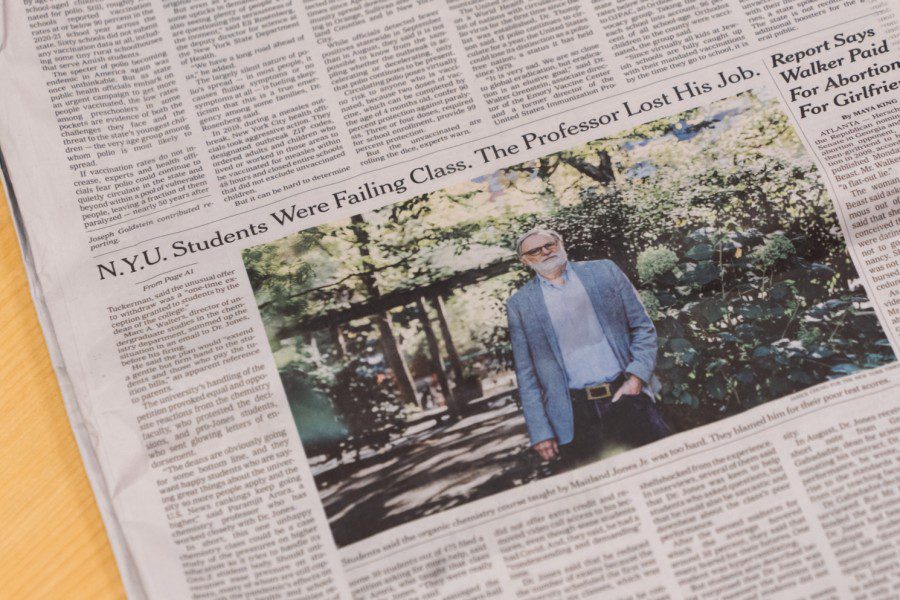Students not to blame for Maitland Jones firing, NYU faculty say
After a group of organic chemistry students organized a petition in protest of Maitland Jones’ teaching methods, the professor’s contract was terminated. NYU faculty members say students shouldn’t be blamed.
The Oct. 4, 2022, edition of The New York Times, in which an article about NYU firing an organic chemistry professor was published. (Kevin Wu for WSN)
October 5, 2022
Maitland Jones — an NYU organic chemistry professor whose contract was terminated after his students petitioned against his teaching practices — made headlines this week, appearing on the front page of The New York Times on Tuesday. Since the story broke, many have placed the blame for his sudden dismissal on the students who created the petition, criticizing them for not stepping up to the challenge of a notoriously difficult university class.
Several NYU faculty members, however, believe that this anger against students is displaced. Instead, they blame the university’s administration for the precarious nature of their contracted, non-tenured positions.
Jones was a contracted faculty member with NYU and had taught at the university for 15 years. When his students started a petition that criticized him for concealing class averages, eliminating access to online lectures and talking down to students in his classes, the dean for science at the university’s College of Arts and Science ended the professor’s contract suddenly, just before the fall 2022 semester began.
“What happened to Maitland Jones is the thing that has made me the most frightened I have ever been as an NYU professor,” said Jacob Remes, a clinical associate professor at the Gallatin School of Individualized Study and an organizer with CFU-UAW Local 7902, the yet-unrecognized union of contracted faculty members at NYU. “What it tells me is, I can be fired. Not when my colleagues want to fire me, not even when my students want to fire me, but when a dean decides that I am more trouble than I am worth.”
CFU-UAW consists of more than 700 contracted faculty members, all of whom are employed temporarily by the university and do not qualify for tenure. The union has not been formally recognized by NYU, so members cannot participate in collective bargaining with the university. Therefore, the university can alter their terms of employment, including salaries and benefits, without union consent or approval.
Remes said that the situation is a stark reminder that the jobs of contracted faculty come with few guarantees. He added that the lack of employment protections that led to Jones’ termination is a perfect example of what has led NYU’s contracted faculty members to unionize. However, he expressed full support for the students who voiced their frustrations with the professor and his class.
“My issue is 100% with the administration and the way they handled it,” Remes said, “Students should feel free to organize and be activists for their needs and their educational experiences.”
Rebecca Karl — the president of NYU’s chapter of the American Association of University Professors and a tenured professor in the history department — agreed that the university was in the wrong for dismissing Jones without due process. She called upon the university to acknowledge CFU-UAW as an organization, and said that a formal recognition would be beneficial to both faculty and students.
“A vast majority of the hugely growing numbers of contract faculty on our campus are staffed by people who live from paycheck to paycheck and who have very hard time making ends meet,” Karl said. “Making them afraid for their jobs and summary dismissal without due process is contemptible for a world class university such as the one that NYU claims to be.”
Karl also took issue with the New York Times article for omitting the fact that contracted faculty at NYU have been attempting to unionize, saying that the article neglected the nuance of the situation.
Elisabeth Fay, another CFU-UAW organizer who teaches in the College of Arts & Science, said that Jones’ dismissal was reminiscent of another incident last year which made her fear for the stability of contracted professors at NYU.
In December of 2021, administrators of NYU’s School of Professional Studies abruptly shut down the school’s Comprehensive English Program, which catered to international students learning English as a second language. All but one of the 12 full time faculty members employed by the institute were told that they would be let go after their contracts expired in August of 2022. More than 50 adjunct faculty members were also either transferred to different departments or terminated as a result of the closure.
Fay emphasized that incidents like the closure of the Comprehensive English Program and Jones’ termination highlight the role of the university in perpetuating job insecurity for contracted workers. She said placing the blame on students was “misguided,” and emphasized that the students who formed the petition did not call for Jones’ dismissal in the first place.
“Every time something like that happens, we are reminded of how little job security we have,” Fay said. “Our students are not the reason that our jobs are insecure. The NYU administration is the reason why our jobs are insecure. Anything that I can do to refocus attention on that would make me happy.”
NYU spokesperson John Beckman told the Times that Jones had received the worst course evaluations across all of the university’s undergraduate science departments. He also wrote that Jones “did not rise to the standards we require from our teaching faculty,” pointing to many student complaints.
“At this moment, it’s really beneficial for the NYU administration to have all of these stories focusing on entitled Gen-Z students making it impossible for faculty to do their jobs,” Fay said. “That’s not a picture of students that I recognize, but it’s one that serves the NYU administration very well right now. They would much rather be talking about undergraduate study habits than the job security of faculty.”
Contact Abby Wilson at [email protected].




























































































































































